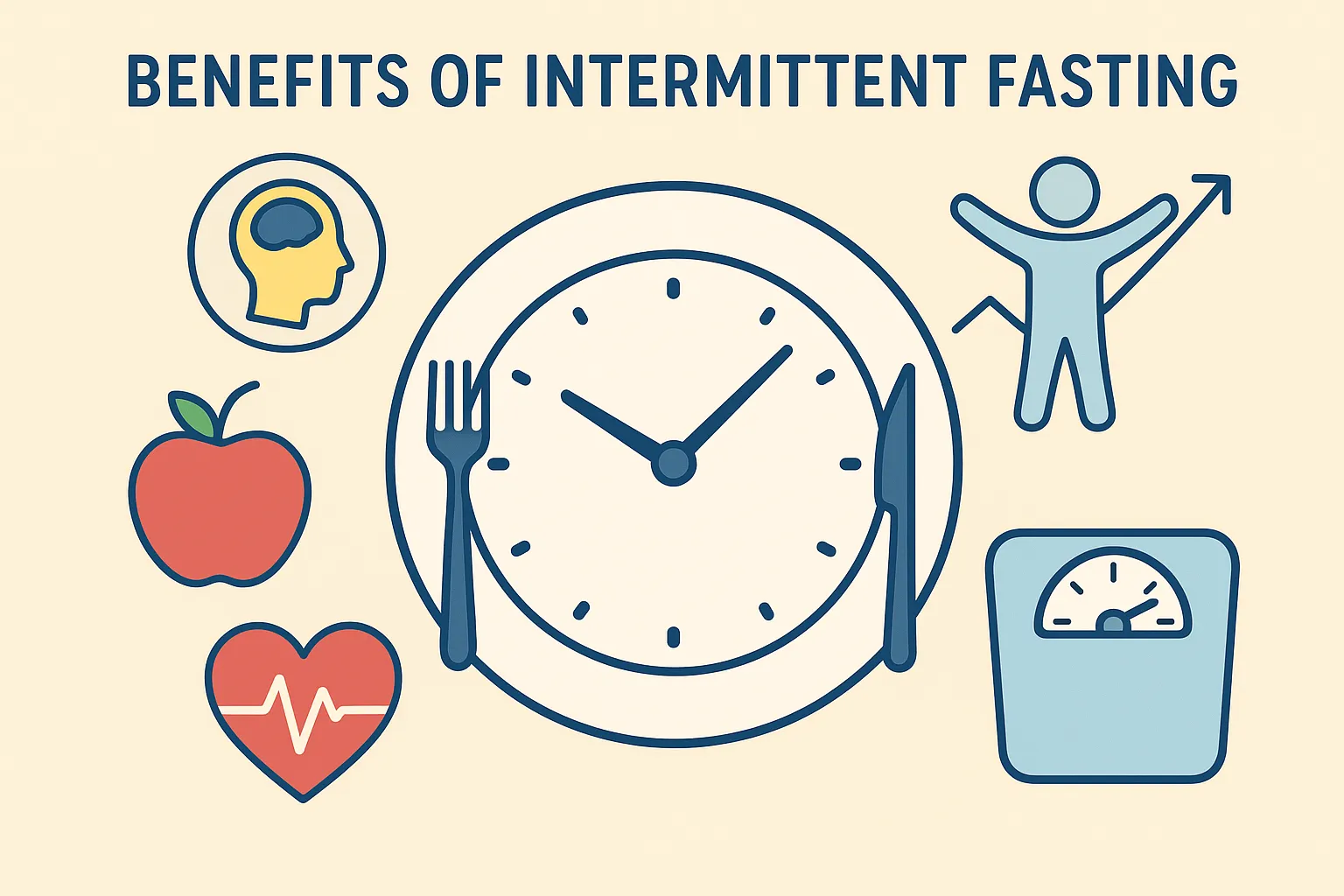Benefits of Intermittent Fasting
In recent years, intermittent fasting has gained massive popularity as a health and lifestyle choice. People from all walks of life have turned to this eating pattern not only for weight loss but also for improving their overall health. Backed by scientific studies and practical experiences, the benefits of intermittent fasting extend far beyond simply skipping meals. This article will explore the advantages of intermittent fasting, organized by time frame and health impacts, so you can clearly understand what to expect on your journey.

Understanding Intermittent Fasting
Before diving into the benefits of intermittent fasting, it’s essential to understand what it is. Intermittent fasting (IF) is not a diet in the traditional sense but an eating pattern. It alternates between periods of eating and fasting, allowing the body to tap into natural biological processes that improve health.
Common approaches include the 16/8 method (fasting for 16 hours, eating during an 8-hour window), the 5:2 method (eating normally for 5 days and restricting calories on 2 days), and alternate-day fasting. Each approach has its unique style, but they all aim to allow the body to reset during fasting hours.
Why People Choose IF
- Simplicity - fewer meals to plan
- Flexibility - can fit any lifestyle
- Health benefits - supported by research
The First 24 Hours: Initial Adjustments
When you begin intermittent fasting, the first 24 hours are often the toughest. The body is accustomed to regular meal schedules, and hunger signals may be strong. However, this stage lays the foundation for the body to adapt.
During the fasting period, the body uses up stored glucose for energy. As glucose levels drop, it slowly transitions to burning stored fat. Many people report feelings of light hunger, but also a surprising increase in mental clarity after the initial adjustment.
Common Experiences
- Hunger pangs that eventually stabilize
- Improved focus due to stable energy release
- Hydration becomes crucial to manage fasting hours
Benefits After One Week
After a week of consistent intermittent fasting, the body begins to adjust. Hunger signals are less intense, and people often notice subtle improvements in energy levels and sleep quality. This is the stage where most start feeling the real benefits of intermittent fasting.
By the end of the first week, many people experience modest weight loss. This is often due to reduced calorie intake and water weight reduction. Beyond the physical, individuals frequently report better mental clarity and more consistent daily energy.
Key Changes in the First Week
- Reduced appetite spikes
- Better insulin sensitivity
- Initial weight management progress
Short-Term Benefits: First Month
Within the first month of intermittent fasting, the benefits become more noticeable. The body is now adapted to fasting cycles, and physiological changes are underway. One of the most significant short-term outcomes is improved metabolic health.
Research shows that intermittent fasting can lower blood sugar levels, reduce inflammation, and enhance hormone regulation. Many also notice that their cravings for processed foods diminish, leading to more mindful eating habits.
Health Markers That Improve
Blood Sugar - Stable blood sugar levels reduce the risk of developing type 2 diabetes.
Cholesterol - Reduction in LDL cholesterol and triglycerides supports heart health.
Medium-Term Benefits: Three to Six Months
At the three- to six-month mark, the benefits of intermittent fasting become profound. Consistency leads to sustainable weight loss, improved metabolic flexibility, and long-term health improvements.
Studies suggest that intermittent fasting during this period helps the body efficiently switch between using glucose and fat as energy sources. This flexibility reduces fatigue and supports endurance. Many also report enhanced emotional well-being and better mood regulation.
Noticeable Benefits
- Steady fat loss
- Improved cardiovascular health
- Enhanced emotional stability
Long-Term Benefits: Six Months and Beyond
Those who maintain intermittent fasting beyond six months often experience transformative results. This stage is less about short-term weight loss and more about long-term health longevity.
Benefits include stronger immune system support, reduced risk of chronic diseases, and a more balanced relationship with food. Many individuals also find they are able to maintain their healthy weight without strict dieting.
Long-Term Outcomes
- Reduced risk of heart disease
- Better gut health
- Consistent energy balance
Cellular and Hormonal Benefits
Beyond visible results, intermittent fasting works at the cellular level. During fasting, the body undergoes autophagy, a natural process where old or damaged cells are broken down and recycled. This supports cellular health and longevity.
Additionally, intermittent fasting improves the balance of key hormones such as insulin, human growth hormone (HGH), and norepinephrine. These hormonal changes accelerate fat burning and protect muscle mass.
Hormonal Shifts
- Increased growth hormone production
- Improved insulin sensitivity
- Enhanced fat metabolism
Mental and Cognitive Benefits
One of the most celebrated benefits of intermittent fasting is its impact on the brain. Fasting has been linked to improved cognitive function, sharper focus, and reduced brain fog. Some studies even suggest it may help protect against neurodegenerative diseases like Alzheimer’s.
By promoting the production of brain-derived neurotrophic factor (BDNF), intermittent fasting supports the growth of new neurons and strengthens existing brain pathways. This results in better memory and problem-solving skills.
Cognitive Enhancements
- Improved focus and concentration
- Reduced risk of cognitive decline
- Boosted memory function
Lifestyle and Emotional Benefits
Intermittent fasting is not just about physical health; it also impacts lifestyle and emotions. Many practitioners find that fasting simplifies life by reducing the need to plan multiple meals, giving them more time and freedom.
Emotionally, intermittent fasting can lead to a healthier relationship with food. Instead of constantly thinking about snacks, people learn to listen to real hunger cues, creating a more mindful approach to eating.
Everyday Benefits
- Simplicity - fewer meals to prepare
- Time-saving - more hours in the day
- Emotional balance - less stress about food choices
Potential Risks and Precautions
While the benefits of intermittent fasting are numerous, it is not suitable for everyone. Individuals with medical conditions, pregnant women, or those with a history of eating disorders should consult a healthcare professional before starting.
Potential side effects include fatigue, irritability, or nutrient deficiencies if fasting is done incorrectly. However, with proper guidance and balance, most people can safely enjoy the advantages.
Who Should Be Cautious
- People with diabetes
- Those on medication
- Anyone with eating disorder history
Conclusion
The benefits of intermittent fasting extend far beyond weight loss. From improved metabolic health and cognitive function to long-term disease prevention and emotional well-being, this eating pattern has a profound impact on both the body and mind. While not a one-size-fits-all solution, intermittent fasting offers a sustainable and science-backed approach to better living. Whether your goal is improved health, longevity, or simplicity, intermittent fasting provides a powerful tool to transform your lifestyle.











